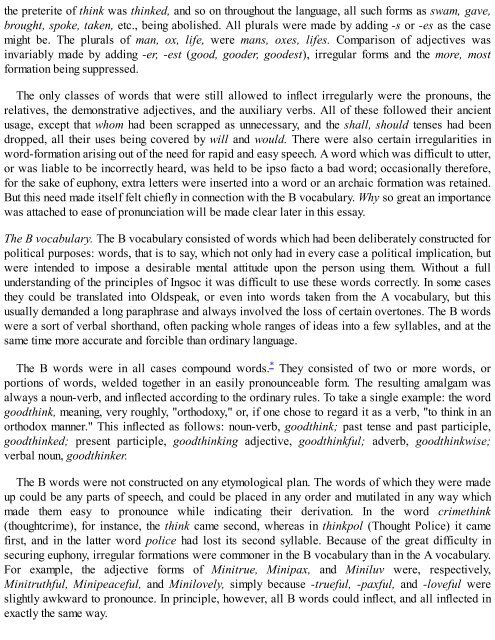You also want an ePaper? Increase the reach of your titles
YUMPU automatically turns print PDFs into web optimized ePapers that Google loves.
the preterite of think was thinked, and so on throughout the language, all such forms as swam, gave,<br />
brought, spoke, taken, etc., being abolished. All plurals were made by adding -s or -es as the case<br />
might be. The plurals of man, ox, life, were mans, oxes, lifes. Comparison of adjectives was<br />
invariably made by adding -er, -est (good, gooder, goodest), irregular forms and the more, most<br />
formation being suppressed.<br />
The only classes of words that were still allowed to inflect irregularly were the pronouns, the<br />
relatives, the demonstrative adjectives, and the auxiliary verbs. All of these followed their ancient<br />
usage, except that whom had been scrapped as unnecessary, and the shall, should tenses had been<br />
dropped, all their uses being covered by will and would. There were also certain irregularities in<br />
word-formation arising out of the need for rapid and easy speech. A word which was difficult to utter,<br />
or was liable to be incorrectly heard, was held to be ipso facto a bad word; occasionally therefore,<br />
for the sake of euphony, extra letters were inserted into a word or an archaic formation was retained.<br />
But this need made itself felt chiefly in connection with the B vocabulary. Why so great an importance<br />
was attached to ease of pronunciation will be made clear later in this essay.<br />
The B vocabulary. The B vocabulary consisted of words which had been deliberately constructed for<br />
political purposes: words, that is to say, which not only had in every case a political implication, but<br />
were intended to impose a desirable mental attitude upon the person using them. Without a full<br />
understanding of the principles of Ingsoc it was difficult to use these words correctly. In some cases<br />
they could be translated into Oldspeak, or even into words taken from the A vocabulary, but this<br />
usually demanded a long paraphrase and always involved the loss of certain overtones. The B words<br />
were a sort of verbal shorthand, often packing whole ranges of ideas into a few syllables, and at the<br />
same time more accurate and forcible than ordinary language.<br />
The B words were in all cases compound words. * They consisted of two or more words, or<br />
portions of words, welded together in an easily pronounceable form. The resulting amalgam was<br />
always a noun-verb, and inflected according to the ordinary rules. To take a single example: the word<br />
goodthink, meaning, very roughly, "orthodoxy," or, if one chose to regard it as a verb, "to think in an<br />
orthodox manner." This inflected as follows: noun-verb, goodthink; past tense and past participle,<br />
goodthinked; present participle, goodthinking adjective, goodthinkful; adverb, goodthinkwise;<br />
verbal noun, goodthinker.<br />
The B words were not constructed on any etymological plan. The words of which they were made<br />
up could be any parts of speech, and could be placed in any order and mutilated in any way which<br />
made them easy to pronounce while indicating their derivation. In the word crimethink<br />
(thoughtcrime), for instance, the think came second, whereas in thinkpol (Thought Police) it came<br />
first, and in the latter word police had lost its second syllable. Because of the great difficulty in<br />
securing euphony, irregular formations were commoner in the B vocabulary than in the A vocabulary.<br />
For example, the adjective forms of Minitrue, Minipax, and Miniluv were, respectively,<br />
Minitruthful, Minipeaceful, and Minilovely, simply because -trueful, -paxful, and -loveful were<br />
slightly awkward to pronounce. In principle, however, all B words could inflect, and all inflected in<br />
exactly the same way.









![Genki - An Integrated Course in Elementary Japanese II [Second Edition] (2011), WITH PDF BOOKMARKS!](https://img.yumpu.com/58322134/1/180x260/genki-an-integrated-course-in-elementary-japanese-ii-second-edition-2011-with-pdf-bookmarks.jpg?quality=85)
![Genki - An Integrated Course in Elementary Japanese I [Second Edition] (2011), WITH PDF BOOKMARKS!](https://img.yumpu.com/58322120/1/182x260/genki-an-integrated-course-in-elementary-japanese-i-second-edition-2011-with-pdf-bookmarks.jpg?quality=85)





